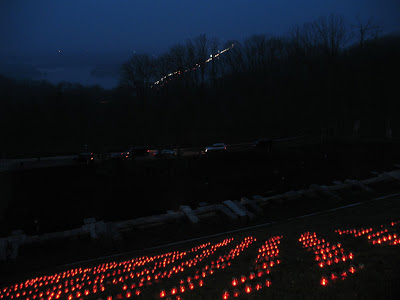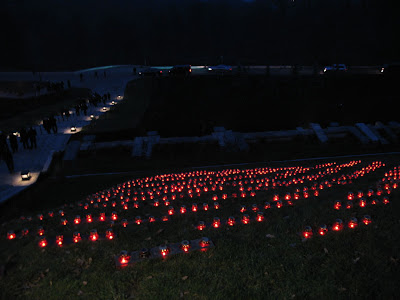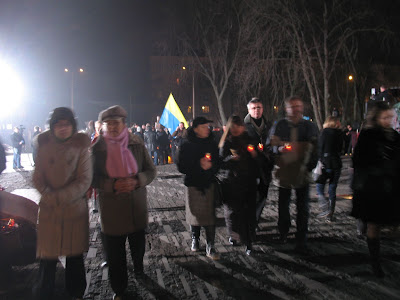Today, Ukraine remembers the millions of men, women and children who starved to death in the Holodomor (Ukr. death by hunger) in 1932-1933.
Stalin’s manmade famine killed at least 3.2 million people: thousands of Russians, Jews, Poles, Moldovanspeople of other ethnicities, and millions of Ukrainians.
Unlike elsewhere in the Soviet Union, the peasants in Ukraine and in the neighboring region of Kuban had nowhere run. By a directive of the Communist Party, barrier troops surrounded these areas, populated mainly by Ukrainians, and ensured that few would escape death.
Deprived of food, entire villages would die slowly and painfully. Deprived of food, people would lose their minds and eat their children. Those on the verge of dying would be piled up on carts and, along with the dead, carried to cemeteries.
The Holodomor dealt a severe blow to the Ukrainian peasantry and contributed to Ukraine’s Sovietization and Russification.
The exact number of the dead will never be known, but the numbers in Soviet and post-Soviet censuses speak for themselves:
USSR (1926)
Russians in USSR: 77,791,124
Ukrainians in USSR: 31,194,976
Ukrainians in Ukraine: 23,218,860
Ukrainians in Russia: 7,873,000
Russians in Ukraine: 2,677,166
USSR (1939)
Russians in USSR: 99,591,520
Ukrainians in USSR: 28,111,007
USSR (1989)
Russians in USSR: 145,155,000
Ukrainians in USSR: 44,186,000
Ukraine (2001)
Ukrainians in Ukraine: 37,541,700
Russians in Ukraine: 8,334,100
Russia (2002)
Russians in Russia: 115,889,100
Ukrainians in Russia: 2,943,000
At the Holodomor Memorial, I didn’t see quite as many people as I saw last year, during the opening ceremony, attended by foreign delegations.
Besides, with Ukraine still reeling from the flu epidemic, it’s natural for people to avoid public gatherings.
Ukraine for the people
Says who?
Says the man behind a huge fence — with surveillance cameras and check points — the man who's building himself another palace on a 336-acre property (privatized with Yushchenko's help and worth tens of millions of taxpayer hryvnias).
It's the same man who opposes the effort to investigate the Holodomor, and calls it an attempt to alienate Ukrainians from Russians.
For the first time in the last few years, I saw people wearing those orange scarves again.
Patriarch Filaret of the Ukrainian Orthodox Church (Kyiv Patriarchate)
Presidential candidate Arseniy Yatsenyuk
Homin, the famous Ukrainian choir
We remember.
Saturday, November 28, 2009
Ukraine Commemorates 76th Holodomor Anniversary
Subscribe to:
Post Comments (Atom)






















































































6 comments:
WOW! Great photos and videos! While I know everyone complained about the price of the memorial it IS good to see so many Ukrainian people acknowledging their history and having a memorial service for those who died. I think that if Ukrainians publicly remember this tragedy it will lead the way for the world to learn about it and acknowledge it also.
May the souls of all these victims rest in peace.
May something like this never happen again.
May we all understand we are all equal.
I'll say a prayer for all people suffering around the world.
¡Saludos!
With the music that was playing in the background in one of the videos you posted, and indeed with all of this, I could not help but be reminded of the "Symphony of Sorrowful Songs" by Gorecki.
Here is part of it - "Mother, protect me" (lento e largo):
http://www.youtube.com/watch?v=miLV0o4AhE4
Michelle,
You’re welcome! We owe it to those who died — and to those who will live after we die — to keep the memory alive.
Gabriela,
Thank you so much! If we forget about the rake we left in the garden, we risk stepping on it.
Elmer,
Thank you for the song! It’s indeed a symphony of sorrow.
We should equally remember the millions of innocent people who perished in famines and wars, in death camps and totalitarian regimes, in terrorist acts and counter-terrorist operations.
How many Ukro-Russians in both Russia and Ukraine today?
Official figures will be available when Russia and Ukraine conduct their next censuses: in 2010 and 2011 respectively.
Post a Comment